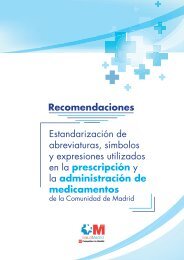lKd7nD
lKd7nD
lKd7nD
Create successful ePaper yourself
Turn your PDF publications into a flip-book with our unique Google optimized e-Paper software.
preserve the ethno-dialect of Spanish important to the story or<br />
adjust the original Spanish so that the lexicon is intelligible to all<br />
Latino ethnicities. The reason for this apparently contradictory<br />
practice is to meet the needs with some books of a general<br />
Spanish-language reader, and with others to faithfully portray<br />
the local culture when it is important to the story. Our children’s<br />
bilingual picture books are purchased nationwide by schools<br />
and their suppliers for bilingual, dual language, and ESL classes,<br />
and for migrant education and literacy programs. We have also<br />
provided free-of-charge hundreds of thousands of bilingual<br />
picture books dealing with health topics—these are distributed<br />
in neighborhoods across the country by community health<br />
workers (promotores) and county clinics.<br />
As part of Piñata we also publish books for middle readers,<br />
again with the same ethos, but in a different format. They are<br />
more text-heavy, divided into various chapters and feature the<br />
complete text in one language, followed by the translation in the<br />
other—except that the translation is upside down in these “flip<br />
books” rather than on the same page or face-to-face.<br />
By the time Latino students have reached high school, and<br />
the education system has worked its acculturation magic, most<br />
of them read English very well, and thus our young adult books<br />
are published primarily in English originals. On occasion we<br />
address the immigrant high school population with a Spanishlanguage<br />
original—of course, preceded by a separate Englishlanguage<br />
translation that has had the benefit of being reviewed<br />
by librarians and educators.<br />
As you can see, the diversity of translation options is<br />
not only dictated by market conditions but also by the social<br />
and educational function that the texts must serve. Although<br />
seemingly complicated to an outside observer, our practices are<br />
culturally and linguistically based; moreover, despite our books’<br />
cultural specificity, they have won numerous awards from the<br />
world at large as well as from Latino critics and judges.<br />
Nicolás Kanellos is the director of Arte Público Press (a recipient of NEA<br />
grants) of the University of Houston, where he has been a professor since<br />
1980. He has published numerous books on Hispanic literature and theater.<br />
The Art of Empathy: Celebrating Literature in Translation<br />
49



